- Home
- Robin McKinley
Spindle's End Page 2
Spindle's End Read online
Page 2
The present king was not only an only child, but had had a very difficult time indeed—or his councillors had—finding a suitable wife. She was not even a princess, finally, but a mere countess, of some obscure little backwater country which, so far as it was known for anything, was known for the fleethounds its king and queen bred; but she was quiet, dutiful, and, so far as any of the cleverest magicians in the land could tell, entirely without magic. Everyone breathed a deep sigh of relief when the wedding was over; it had been a wait of nearly a decade since the king came of marriageable age.
But the years passed and she bore no children.
Certain of the king’s cousins began to hang around court more than they used to—his generation was particularly rich in cousins—and one or two of these quietly divorced spouses who were insufficiently nonmagical. There had not been a break in the line from parent to child in the ruling of this country for over five hundred years, and the rules about how the crown was passed sideways or diagonally were not clear. Neither the king nor the queen noticed any of this, for they so badly wanted a child, they could not bear to think about the results if they did not; but the councillors noticed, and the king’s cousins who divorced their spouses did themselves no good thereby.
Nearly fifteen years after the king’s marriage the queen was seen to become suddenly rather pale and sickly. Her husband’s people, who had become very fond of her, because she was always willing to appear at fairs and festivals and smile during boring speeches and to kiss the babies, even grubby and unattractive ones, which were thrust at her, were torn between hoping that whatever she had would kill her off while the king was young enough to remarry (and there was a whole new crop of princesses grown up to marriageable age outside the borders as well as a few within), and hoping that she would get well and come to more fairs and festivals and kiss more babies. The givers of boring speeches especially wished this; she was the best audience they had ever had.
The truth never occurred to anyone—not even when she began to wear loose gowns and to walk more heavily than she used to—because there had been no announcement.
The king knew, and her chief waiting-woman knew, and the fairy who disguised the queen’s belly knew. But the fairy had warned the king and queen that the disguise would go so far and no further: the baby must be allowed to grow unmolested by tight laces and the queen’s balance not be deranged by high-heeled shoes. “A magician might make you a proper disguise,” said the fairy, whose name was Sigil, “and let you dance all night in a sheath of silk no bigger around than your waist used to be; but I wouldn’t advise it. Magicians know everything about magic and nothing about babies. I don’t know nearly as much about magic as they do—but I know a lot about babies.”
Sigil had been with the king’s family since the king’s mother had been queen, and the king loved her dearly, and his queen had found in her her first friend when she came to her husband’s court, when she badly needed a friend. And so it was to Sigil the queen went, as soon as she knew for sure that she was pregnant, and begged for the disguise, saying that she had longed for a child for so many years she thought she could not bear the weight of the watchfulness of her husband’s people, who had longed for this child all these years, too, if her pregnancy were announced. The king, who had wanted to declare a public holiday, was disappointed; but Sigil sided with the queen.
The poor queen could not quite bring herself, after all the long childless years, to believe it when her friend told her that the baby was fine and healthy and would be born without trouble—“Well, my dear, without any more trouble than the birth of babies does cause, and which you, poor thing, will find quite troublesome enough.” And so the birth of an heir was not announced until the queen went into labour. The queen would have waited even then till the baby was born, but Sigil said no, that the baby must be born freely into the world, and freely, in an heir to a realm, meant with its people waiting to welcome it.
The country, that day, went into convulsions not unlike those the poor queen was suffering. An heir! An heir at last! And no one knew! The courtiers and councillors were offended, and the highest-ranking magicians furious, but their voices were drowned out in the tumult of jubilation from the people. The news travelled more quickly than any mere human messenger could take it, for the horses neighed it and the trees sang it and the kettles boiled it and the dust whispered it—an heir! The king’s child is born! We have an heir at last!
It was a girl, and the names chosen to be given her on her name-day were: Casta Albinia Allegra Dove Minerva Fidelia Aletta Blythe Domina Delicia Aurelia Grace Isabel Griselda Gwyneth Pearl Ruby Coral Lily Iris Briar-Rose. She was healthy—just as Sigil had said she would be—and she was born without any more trouble than the birth of babies does cause, which is to say the queen was aching and exhausted, but not too exhausted to weep for joy when the baby was laid in her arms.
The eldest child of the reigning monarch was always next in line for the throne, be it boy or girl; but it was usually a boy. There was a deeply entrenched folk myth that a queen held this country together better than a king because there is a clear-eyed pragmatic common sense about an unmagical woman that even the most powerful—or rather, especially the most powerful—magic found difficult to disturb; it was thought that a man was more easily dazzled by pyrotechnics. Whether this was true or not, everyone believed it, including the bad fairies, who therefore spent a lot of their time making up charms to ensure the birth of male first children to the royal family. The royal magicians dismantled these charms as quickly as they could, but never quite as quickly as the bad fairies made them up. (As it was difficult to get any kind of charm through the heavy guard laid round the royal family, these charms had to be highly specific, with the knock-on effect that third children to a reigning monarch were almost always girls.) But the folk myth (plus the tangential effect that first-born princesses were rare enough to be interesting for no reason other than their rarity) guaranteed that the birth of a future queen was greeted with even greater enthusiasm than the birth of a mere future king; and so it was in this case. No one seemed to remember, perhaps because their last queen had been nearly four hundred years ago, that the queen had left some unfinished business with a wicked fairy named Pernicia, who had sworn revenge.
The princess’ name-day was going to be the grandest occasion that the country had ever seen, or at least that the oldest citizen could remember—grander than the king and queen’s wedding sixteen years ago—grander than the king’s parents’ wedding, almost fifty years ago, and certainly grander than the king’s own name-day because he’d been born eighteen months after his parents’ wedding and no one had realised he was going to be the only one.
The king and queen wanted to invite everyone to the name-day. Every one of their people, they felt, should have the opportunity to join them on their day of joy and celebration. They were talked out of this ridiculous idea by their councillors—uncharacteristically in agreement on this particular topic—with some difficulty.
It had been the queen’s idea to begin with. Her native country was just about small enough that everyone could be invited to a major royal occasion (although the royal list-makers and caterers and spare-chair-providers would hope that not everyone came), and the king and queen recognised by sight a substantial minority of their subjects. While she found her husband’s country rather intimidatingly larger (and it seemed all wrong to her that many of his subjects would never meet their king), in times of great importance she reverted to her upbringing. The king was lucky enough to love his wife, and had been rather struck by her tales of a king and queen who had open court days, when anyone who wished to speak to them could turn up and do so. He thought an open name-day a splendid notion.
It will not do, said the councillors and courtiers. (The magicians were still nursing their snit about not having been told of the queen’s pregnancy, and refused to attend the discussions about the name-day. What they were really outraged about, of course, was that a me
re fairy had successfully thrown fairy dust in all their eyes.) You must, said the councillors, have the sort of name-day that other countries will send emissaries to—we will need their good wishes, their favourable memories, in nineteen or twenty years’ time. And you cannot make the sort of fuss that an emissary is going to remember pleasantly if a hundred thousand or so of your people are milling around the city walls, trampling the fields into mud, and demanding to be fed and housed.
This made the king and queen thoughtful, for the king remembered the long difficult search for his wife, and the queen remembered what a shock it had been when the envoy had presented himself at her father’s rather small and shabby castle, and she had had to be rushed out of the kitchens where she was boiling sweetmeats and up the back stairs to wash her face and comb her hair and put on her best dress to meet him. (He had been eating her sweetmeats with a look of great concentration and contentment, when she had made a stately entrance into the front room, slightly out of breath from having hopped down the corridor on one foot and then the other, pulling on her shoes. She hadn’t realised that her sweetmeats, excellent though she knew them to be, would render even a king’s envoy happy to wait.)
A compromise was reached. It was the sort of compromise that made the councillors gnash their teeth, but it was the best they had been able to wrest from their suddenly obstinate rulers, who would keep insisting that their daughter belonged to her people. Heralds would be sent out to every village—each and every village—to proclaim at the town centre, which might be anything from the steps of the mayor’s house in the larger to the town well or watering-trough in the smaller, that one person, to be chosen by lot (if the magicians had recovered from their snit, they would provide cheat-proof lots; otherwise Sigil would find fairies to do it), was invited to the princess’ name-day. And that one person, whoever he or she was, need only present the lot, as good earnest of the invitation, to be allowed entry into the royal grounds on the name-day.
The councillors and courtiers could only see the fabulous amount of organisational work, and, magicians or no magicians, the infinite amount of cheating that would go on—or at least would try to go on—as a result of this plan. And while the court folk were applying court mores to many ordinary people who wouldn’t know a political intrigue if it grew butterfly wings and bit them, it was true that the heralds, who were themselves ordinary people under their livery, tended to let it be known, especially at the smaller villages, at the local pub after the official announcement was made, that the king and queen had wanted to invite everyone, really everyone. And that if the person with the royal lot showed up with a friend or two, chances were they’d all get in.
That took care of the common citizens, and, barring the number and manner of them, that was the easy part. Much harder were the high tables: who would sit near the king or the queen, who would have to make do at a slightly less high table headed by a mere prince or duke or baron, which countries were to be invited to send emissaries, and whether the fuss made over the emissaries should have more to do with the size and status of the country, or the number of unmarried sons in the royal family.
But hardest of all was what to do about the fairies.
Court magicians were members of the court, and there would be special high tables just for them, where they could compare notes on astrological marvels, cast aspersions on the work of other magicians not present to defend themselves, and be slightly world-weary about the necessity of coming to so superstitious and ridiculous an event as a royal name-day.
But fairies were a different kettle of imaginary watery beings. Some fairies were nearly as powerful as the magicians, and what they thought and did was much more varied and unpredictable. Magicians had to attend the Academy for a number of years, and anyone calling himself a magician—since it was usually a he—had a degree in hippogriff leather to show for it, although no one but another magician would be able to read the invisible writing on it. Magicians could make earthquakes happen if they wanted to, or a castle go up (or down) in a night, and a properly drawn-up magician’s spell could last a lifetime. Mostly they were hired by powerful people to spy on their powerful neighbours, and to demonstrate their existence, so that the powerful neighbours didn’t try anything with their own magicians. (Fetes where the magicians of rival families would be present were always well attended, because the spectacles were sure to be exceptionally fine.) Magicians without a taste for this sort of flash stayed at the Academy, or at other academies, pursuing the ultimate secrets of the universe (and philosophies concerning the balance of magic), which were, presumably, dangerous, which was why Academicians tended to have long sombre faces, and to move as if they were waiting for something to leap out at them. But the point was that magicians had rules. Fairies were the wild cards in a country where the magic itself was wild.
Even the queen was a little hesitant about issuing a blanket invitation to fairies. Several hundred fairies together—let alone several thousand—in one place were certain to kick up a tremendous dust of magic, and fate only knew what might be the outcome.
“But most fairies live in towns and villages, do they not?” said the queen. “So they are, in a way, included in the invitation our heralds are carrying.” The fact was that no one really knew how many fairies—even how many practising fairies—there were in the country; the ones people knew about were the ones who lived in the towns and villages with other people and visibly did magic. There were known to be fairies who lived in the woods and the desert places (and possibly even in the waters), but they were rarely seen, and it was only assumed that they were fewer than the known ones.
There were also, of course, wicked fairies, but there weren’t many of them, and they tended to keep a low profile, because they knew they were outnumbered—unless someone angered them, and people tried very, very hard not to anger them. It was the malice of the wicked fairies that gave the good ones a lot of their most remunerative work putting things back to rights, but generally speaking, things could be put back to rights. People were diligently cautious about bad fairies, but they didn’t worry about them too much; less than they worried about the weather, for example, a drought that would make crops fail, or a hard winter that would bring wolves into the towns. (It was actually easier if droughts or hard winters were caused by a bad fairy, because then what you did was very straightforward: you hired a good fairy to fix it. The capriciousness of real weather was beyond everybody, even the united efforts of the Academy, who periodically tried.)
“I think,” said the king slowly, “I think that’s not quite enough.”
The queen sighed. “I was afraid you’d say that.” There had been relatively little magic in her father’s country and she had never quite adjusted to the omnipresence of magic, and of magical practitioners. Magic had its uses, but it made her nervous. Sigil she loved dearly, and she was at least half-friends with several of the other fairies strategically employed in the royal household; the magicians she mostly found tiresome, and was rather relieved than otherwise that none of them were at present speaking to her because they blamed her for the secrecy of her pregnancy.
There was a pause. “What if,” said the queen at last, “what if we invited a few fairies to be godmothers to our daughter? We could ask twenty-one of them—one each for her twenty-one names, and one each for the twenty-one years of her minority. Twenty-one isn’t very many. There will be eighty-two magicians. And it will make the fairies seem, you know, wanted and welcome. We can ask Sigil whom to invite.”
“Fairy godmothers?” said the king dubiously. “We’ll have a time getting that past the court council—and the bishop.”
Sigil had been worrying about the fairies, too, and thought that inviting one-and-twenty fairies to be godmothers would be an excellent idea, if they could hedge it round first with enough precautions.
“No gifts,” said the king. “Too controversial.”
“Oh, godmothers must give gifts!” said the queen. “It would be terribly rude
to tell them they mustn’t give their godchild anything!”
“The queen’s right,” said Sigil, “but we can tell them they must be token gifts only, little things to amuse a baby or flatter a baby’s parents, nothing—nothing—difficult.” What she meant, the king and queen both knew, was nothing that would make the princess unduly visible on the ethereal planes. That sort of thing was the province of heroes, who were old enough to choose it and strong—or stupid—enough to bear it. “And I think we should invite at least one man. Male fairies are underappreciated, because almost no one remembers they exist.”
“You must be the first of the godmothers, dear,” said the queen, but Sigil shook her head.
“No . . . no,” she said, although the regret was clear in her voice. “I thank you most sincerely. But . . . I’m already too bound up in the fortunes of this family to be the best godmother for the new little one. Give her one-and-twenty fresh fairies, who will love the tie to the royal family. And it can be quite a useful thing to have a few fairies on your side.” The king remembered a time when he was still the prince, when one of the assistant chefs in the royal kitchens, who was also a fairy, was addressed by a mushroom, fried in butter and on its way to being part of a solitary late supper for the king, saying, “Don’t let the king eat me or I’ll poison him.” There was always a fairy or two in the royal kitchens (the rulers of this country did not use tasters) and while it took the magicians to find out who was responsible for the presence of the mushroom, it was the fairy who saved the king’s life.
Sigil took the queen’s hands in her own. “Let me look after the catering. What do you think the cradle should be hung with? Silk? And what colours? Pink? Blue? Lavender? Gold?”
“Gold, I think,” the queen said, glad to have the question of the fairy godmothers agreed upon, but disappointed and a little hurt that Sigil refused to be one of them. “Gold and white. Maybe a little lavender. And the ribbons should have pink and white rosettes.”

 Spindle's End
Spindle's End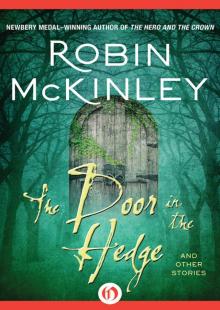 The Door in the Hedge: And Other Stories
The Door in the Hedge: And Other Stories The Blue Sword
The Blue Sword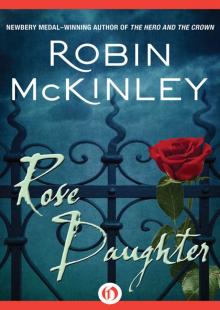 Rose Daughter
Rose Daughter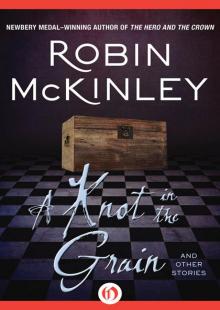 A Knot in the Grain and Other Stories
A Knot in the Grain and Other Stories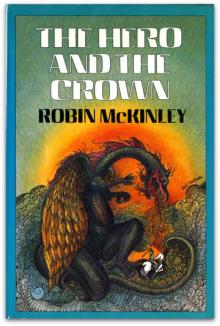 The Hero And The Crown
The Hero And The Crown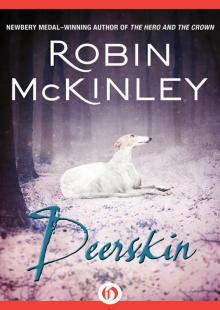 Deerskin
Deerskin Sunshine
Sunshine Beauty: A Retelling of the Story of Beauty and the Beast
Beauty: A Retelling of the Story of Beauty and the Beast Shadows
Shadows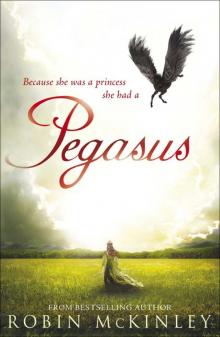 Pegasus
Pegasus Chalice
Chalice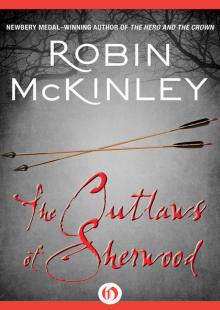 The Outlaws of Sherwood
The Outlaws of Sherwood Fire: Tales of Elemental Spirits
Fire: Tales of Elemental Spirits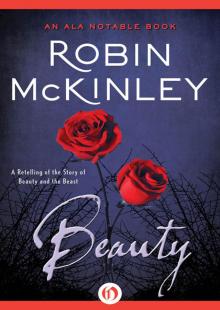 Beauty
Beauty Dragon Haven
Dragon Haven The Hero And The Crown d-2
The Hero And The Crown d-2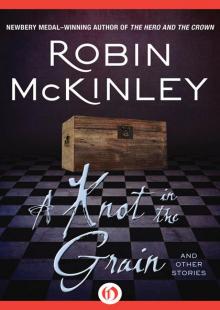 A Knot in the Grain
A Knot in the Grain The Blue Sword d-1
The Blue Sword d-1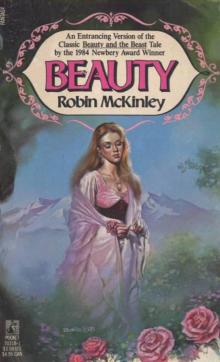 Beauty (v1.2)
Beauty (v1.2)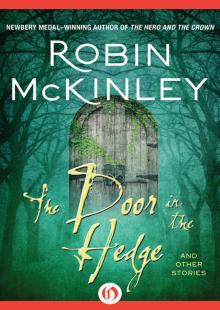 The Door in the Hedge
The Door in the Hedge